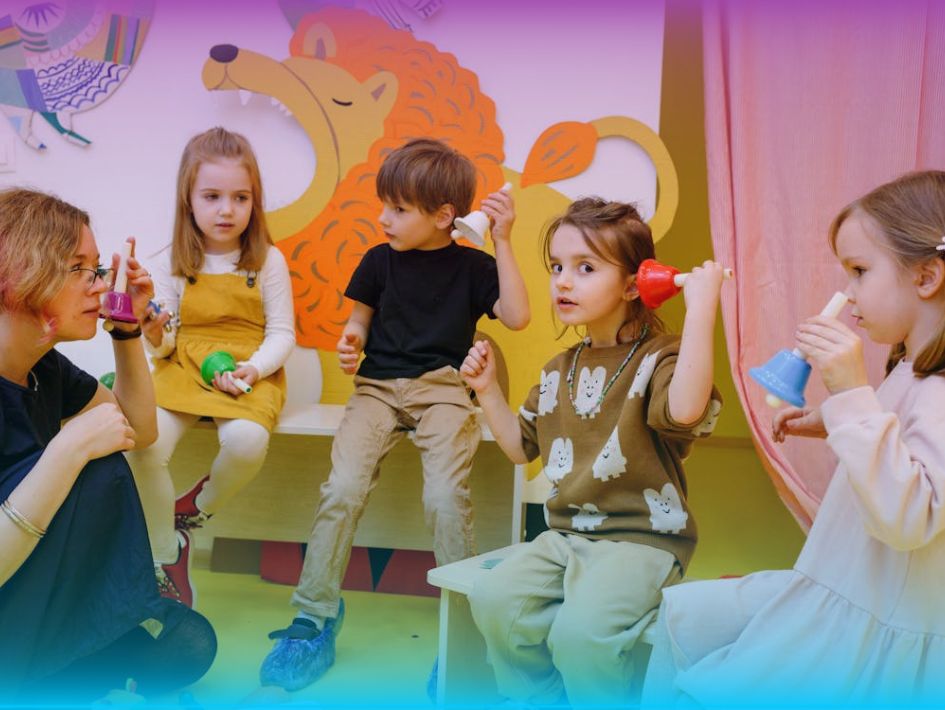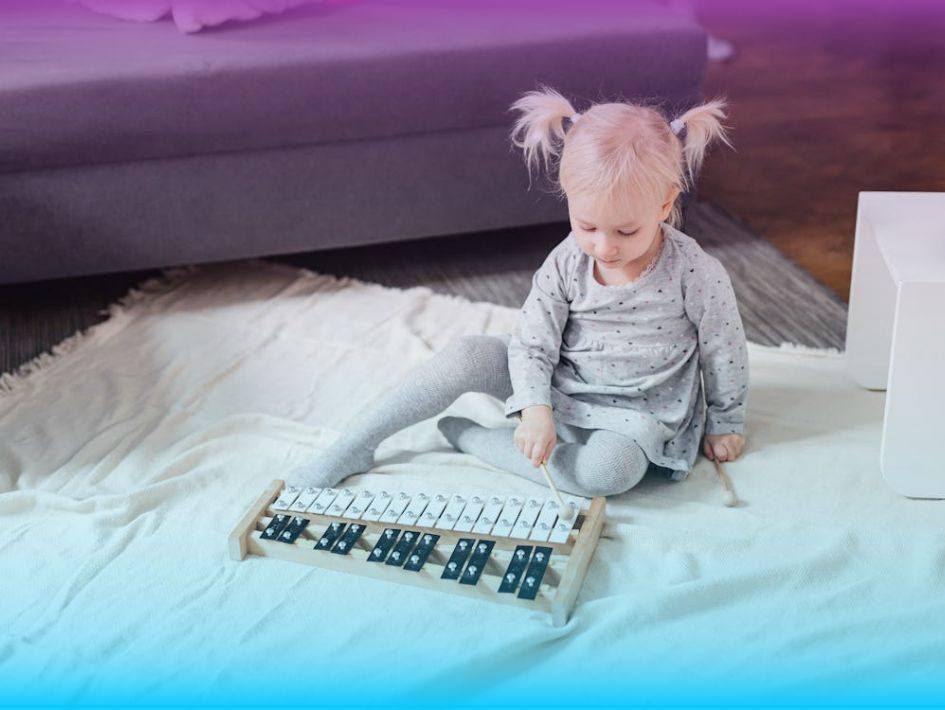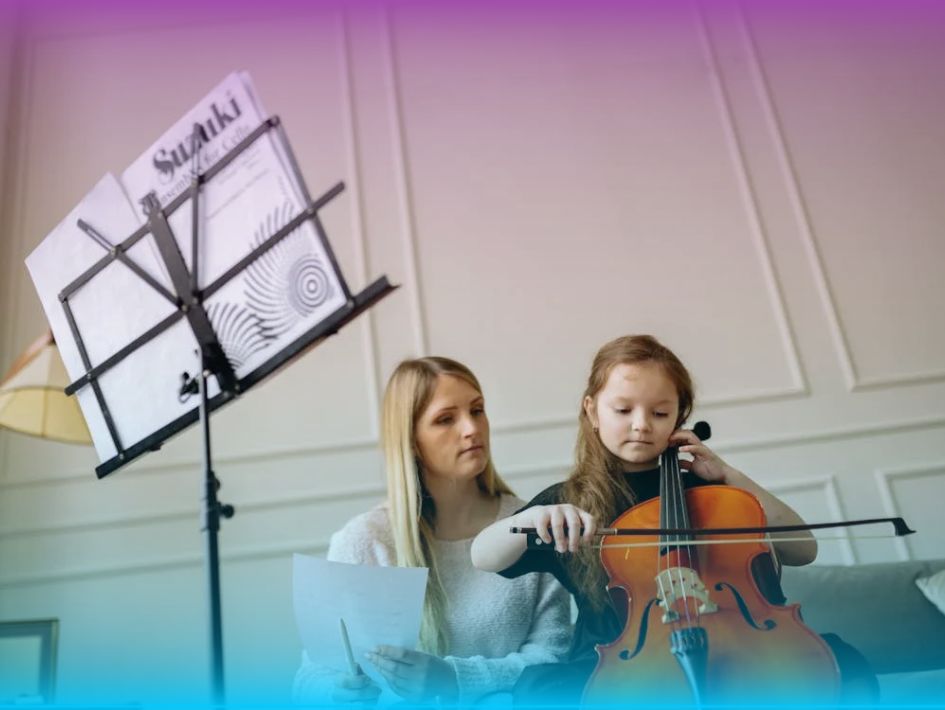Teaching music helps kids be creative, focus better, and feel good about themselves. It's more than just learning an instrument. One of the most potent tools in repetition in music education is repetition itself. Repeating music helps kids learn it better, get better at it, and understand it more.
But why is repetition so essential when teaching music to children? How do repeating songs, rhythms, and exercises help children learn better? In this post, we'll explore how repetition plays a critical role in teaching music to children and its many benefits.
How Repetition Helps Young Children Learn Music
Repetition is vital to how young
children learn new skills, including music. Repeating songs, exercises, or notes helps kids remember what they learned. Here are some ways repetition in music education helps young learners:
1. Strengthens Memory and Recall
Music is all about patterns; repetition helps young learners commit these patterns to memory. Repeating a melody or rhythm helps kids see patterns in the music. This makes it easier for them to remember and play it later. It's like memorizing a favorite song – the more you hear it, the better you know it.
2. Builds Confidence
At first, children may struggle to play a song or piece of music correctly, but as they repeat it over time, they begin to master it. This repeated success builds their Confidence. They feel more accomplished whenever they play a favorite song better or correctly. This Confidence, in turn, encourages them to keep practicing and improving.
3. Develops Physical Coordination
Playing an instrument requires cooperation between the hands, eyes, and sometimes feet. Repetition helps children develop the muscle memory they need to play the instrument effectively. For example, practicing scales and songs help kids coordinate their hands and eyes.
4. Improves Focus and Discipline
Repetition teaches children to stay focused and disciplined. Repeating helps kids stay focused on practicing and overcoming challenges. As their concentration improves, so does their ability to focus on other tasks outside of music.
5. Enhances Listening Skills
The ability to listen and distinguish subtle differences in tone, pitch, and rhythm is crucial in music. Repeating helps kids listen better to the music. Over time, they become better listeners, which improves their musicality.
Effective Repetition Techniques for Music Teachers
Music teachers can use different techniques to help kids learn through repetition. Here are some of the best ways to use repetition in the classroom:
1. Chunking
Instead of having students repeat an entire song or piece of music, break it into smaller sections or "chunks." Focusing on one part at a time helps kids learn without feeling overwhelmed. A teacher might have kids practice a small part of a song until they get it right, then move on to the next part.
2. Slow Practice
Repeating a piece of
music at a slower tempo can help students focus on accuracy and technique. Slower practice allows them to identify mistakes they might miss when playing faster. Once kids are comfortable playing slowly, they can gradually speed up and repeat until they reach the right speed.
3. Varied Repetition
Repetition doesn't have to be the same every time. Teachers can change a piece's speed, key, or loudness to keep practice interesting. This keeps things interesting for children while reinforcing learning the same material.
4. Call and Response
A fun way to use repetition is through call-and-response. The teacher plays or sings a line, and the students repeat it. This helps kids remember and play with more Confidence.
5. Positive Reinforcement
After each round of practice, teachers should praise students for their efforts. Even if it's imperfect, positive feedback helps kids keep practicing and improving.
Importance of Repetition in Early Music Education
In early music education, repetition is essential. Children are just starting to grasp the fundamental concepts of music, so repetition is crucial to their development. Here are some of the ways repetition helps in the early stages of learning music class:
1. Establishing a Strong Foundation
In the beginning stages of kids music education, students learn the basics: notes, rhythms, scales, and how to hold their instrument. Repetition helps to establish a strong foundation by reinforcing these fundamental skills. The more they repeat these basics, the more automatic they become, allowing the child to build on them and progress more quickly.
2. Creating Musical Habits
Learning an instrument isn't just about understanding the theory; it's about developing habits. Repetition helps young learners develop habits like proper posture, hand placement, and rhythm. These habits, once ingrained, will carry over into more advanced playing.
3. Promoting Emotional Expression
Repeating a piece helps kids express themselves through music. They can experiment with how they play it, which helps them connect with the music more deeply.
Teaching Music to Preschoolers with Repetition
Repetition can also incredibly effectively teach music to younger children, such as preschoolers. Kids are still learning to listen and coordinate, so repeating helps them understand essential music. Here are some strategies for teaching music to preschoolers with repetition:
1. Simple Songs and Rhythms
Preschoolers are best introduced to music through simple, repetitive songs. Songs like "Twinkle, Twinkle Little Star" or "Row, Row, Row Your Boat" are excellent for young children. These songs are repetitive in melody and lyrics, making them easier for preschoolers to learn and remember.
2. Rhythm Clapping and Movement
Besides singing, preschoolers can clap, stomp, or play instruments like tambourines. This helps them learn rhythm and coordination, which are essential for music.
3. Musical Games
Musical games incorporating repetition can be a fun way to teach music to young children. For example, playing "Freeze Dance" helps kids move to the music and learn the steps.
Repetitive Learning Methods for Music Educators
A structured learning environment with repetition helps students learn music. Here are some methods teachers can use to make repetition effective and engaging:
1. Daily Practice
Encourage students to practice daily, even if it's for a short amount of time. Regular repetition helps students improve steadily and ensures that skills stay active. Establishing a daily practice routine is a good way to build repetition into a student's routine.
2. Use of Technology
Technology can be an excellent tool for repetitive learning. Apps that can help kids slow down, loop, or play along with music to practice on their own.
3. Group Sessions
Repetition in a group setting can also be very beneficial.
Group music lessons or ensemble practice allows students to repeat pieces while learning to stay on time with others. This can help reinforce the same concepts they're learning individually but with an added layer of teamwork.
Building Skills, Confidence, and Enjoyment for Children
Repetition is a cornerstone of effective teaching of music to children. Whether helping young learners strengthen their memory, develop motor skills, or build Confidence, repetition is critical to successful music learning.
From preschoolers to older children, repetition helps children internalize musical concepts and makes them feel more comfortable with their instruments. By using varied repetition techniques and establishing a structured practice routine, teachers can make learning music enjoyable and rewarding experience for children of all ages.
Explore Muzeg: Your Go-To Resource for Teaching Music to Children
If you want to discover more helpful tools and resources for teaching music to children,
visit Muzeg. Whether you're a parent, a music teacher, or just starting your musical journey, Muzeg has everything you need to help children learn and grow through the power of music!
Final Thoughts
The role of repetition in teaching music to children cannot be overstated. It provides the foundation for skill development, confidence-building, and musical growth. Whether it's helping children memorize a song, develop rhythm, or learn the basics of playing an instrument, repetition is key to their success.
As music educators and parents, we should embrace repetition as a powerful tool, allowing children to build their musical abilities and foster a lifelong love for music.


